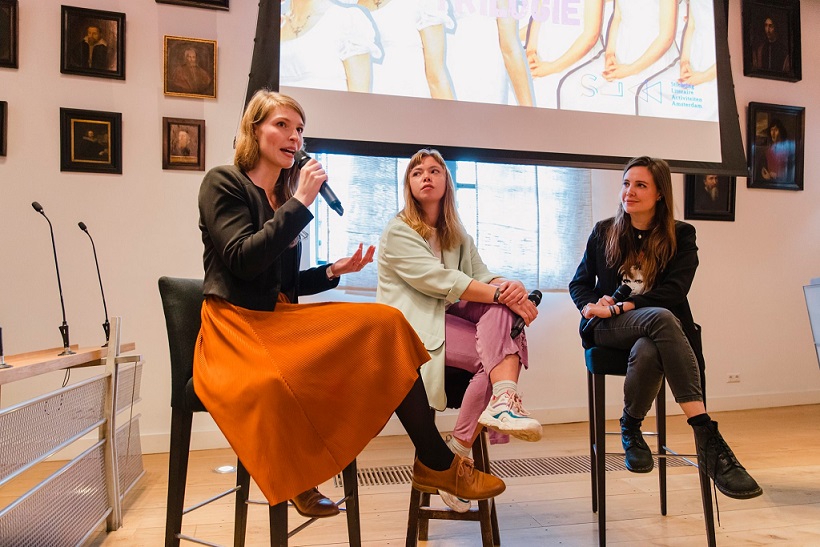Fans in an uncertain world
Fans making Harry Potter necklaces and quilts or writing their own Star Trek spin-offs – researcher Welmoed Wagenaar has seen it all. In fact, she admits, she herself is ‘still obsessed with Harry Potter’. As a teenager, Wagenaar spent hours browsing online forums and discovering ‘fan fiction’: fiction written by fans who borrow characters and other elements from existing story worlds to create new stories. Her fascination led her to conduct research into online media fandoms, with the help of a grant provided by the Dutch Research Council (NWO).
Text: Annemieke van der Kolk, Communication Office

Fan art and fan fiction
A ‘media fandom’, Wagenaar explains, is a broad term that describes a subculture or community of people who share a great enthusiasm for a mediated element of popular culture – think, for example, of music, books, films, TV series and games. ‘Fans feel such a deep emotional connection to a work of art that they want to revisit it over and over again, for example by re-reading it or watching it again. Some look for additional information or have discussions with fellow fans, whereas others go a step further and write fan fiction or create fan art.’ Wagenaar wants to find out how media fans give meaning to their beloved story worlds in their daily lives and what role online platforms play in this.
Ritual view
Wagenaar is a religious studies expert and therefore takes a rather specific view of fandoms. Academic theory on rituals and sacralization helps her to understand how fans incorporate the things that they do and see online into their everyday lives. ‘The field of ritual studies in particular focuses on the relationships between different worlds or realities: ritual/non-ritual, religious/non-religious, sacred/profane. Ritualized actions can give objects, places and practices a special ‘sacred’ value or power, which affects how people shape or understand their lives. For example, people can create a brief magical moment or invoke an image of potential, creativity and imagination. In my research, I am looking at what such theory can teach us about fandoms and vice versa.’
More kudos thanks to corona
The coronavirus has caused the world to go online en masse. Has this resulted in new media fans, or have existing fans become more active? ‘The popular fan-fiction website Archive of Our Own (AO3) posted an overview of its 2020 year-to-date statistics in early May. It appears that both the daily website traffic and the numbers of works, comments and ‘kudos’ (AO3’s version of ‘likes’) posted every day have skyrocketed since a major part of the world went into lockdown. In addition, the contrast that can normally be seen between busy weekends and quieter weekdays has decreased. I don’t know to what extent the increased traffic concerns new users, but it does appear that fans are a lot more active than usual, at least in terms of fan fiction.’
Need for a familiar world
Wagenaar understands why fan fiction is so attractive in the current situation, although she also suspects that some fans lack the energy to get involved in fan fiction right now. ‘Fan fiction enables fans to revisit familiar characters and worlds. In addition, a platform such as AO3 offers them the possibility to search very specifically for works that invoke certain emotions. Popular genres include ‘Hurt/Comfort’ and ‘Angst with a Happy Ending’. When the world you live in is uncertain and your emotions are all over the place, it can be very reassuring to fall back on your favourite characters and on stories in which you know what to expect in terms of emotions.’

Market value
Fans play an important role in today’s media culture, and the media industry is well aware of this. This is not always a good thing, Wagenaar thinks. ‘Major media conglomerates such as Disney are very well aware of the market value of a large, loyal fan base and will not hesitate to use the fans’ love and creativity, often without any reward. Take, for example, queerbaiting: hinting at same-sex relationships between characters in order to generate popularity among the LGBTIQ+ community, without actually depicting such relationships.’ Just how critical fans can be of what happens to their favourite story worlds or characters was illustrated by the anger among Game of Thrones fans at the end of the disappointing final season. ‘A petition to have the season rewritten by different authors was signed 1.8 million times – but was unsuccessful, as most of these types of petitions turn out to be.’
The advantages of fandoms
Should we worry about people who escape into online fandoms? ‘I don’t think that taking a temporary retreat – which, by the way, is the same thing that books offer – into online fan practices is by definition problematic. For example, one of my research subjects said that active fandoms had taught her to take a more critical view of media, and many fan fiction authors talk about how fan fiction teaches them to write better. In addition, a shared passion can be a good foundation for social connections. Many of the people I talked to referred to the social component of fandoms and the national and international networks of friends that they had built up via online fan environments – myself included: my best friends are people I met on an online fan forum when I was fifteen.’ After a long day at work, instead of curling up on the sofa with an old-fashioned book, Wagenaar prefers to take out her laptop and read a nice fanfic.
Contact: Welmoed Wagenaar
More news
-
06 January 2026
Connecting with history
